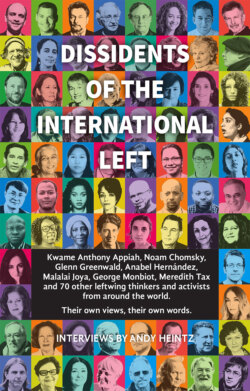Читать книгу Dissidents of the International Left - Andy Heintz - Страница 14
На сайте Литреса книга снята с продажи.
ОглавлениеMICHAEL BERUBE
Michael Berube is a professor of literature and Director of the Institute for the Arts and Humanities at Pennsylvania State University. He is the author of eight books to date, including Public Access: literary theory and American cultural politics, The Left at War and Life As We Know It, the last of which was a New York Times Notable Book of the Year.
Why hasn’t there been an international progressive socialist movement against neoliberalism and religious fundamentalism?
It’s not clear what kind of coherent vision the international Left would flock to. The Occupy Movement in the United States did try to create a movement that opposed growing inequality and neoliberalism, and that flourished for a while; in 2015-16 it made itself felt in Bernie Sanders’ insurgent campaign for president. When it comes to deciding whether to organize around freedom or equality, it seems much more plausible and viable for an international Left to organize around equality – because, as I put it in The Left at War, organizing around international freedom sounds a bit like organizing around an international system of weights and measures. It’s the kind of thing that people care about if they are part of Human Rights Watch, Amnesty International and Doctors Without Borders.
There is a loosely affiliated international Left opposed to neoliberalism and austerity. But you’re correct that there is no international movement to combat Islamic fundamentalist groups like ISIS. There isn’t a popular groundswell for human rights around the globe. For the international Left, perhaps it seems like too abstract a goal.
How much of Islamic extremism can be attributed to a genuine grassroots movement, and how much can be attributed to US foreign policy?
I think it’s a mistake to attribute every form of backlash and blowback to US foreign policy, while on the other hand it’s a mistake to pretend that US policy has not had any influence on the contours of resistance movements. Let’s take the example of Iran. As vexed as I was by Jimmy Carter’s presidency (the registration of a peacetime draft, the saber-rattling over Afghanistan, pulling out of the Olympics), I have some degree of retroactive sympathy for whoever was in the White House in 1979-80 because, between Iran, Nicaragua and Afghanistan, they had no idea what was happening. They interpreted all three of those things in Cold War terms, and with Afghanistan and Nicaragua that made sense. I realized that to a lot of people in the State Department and the CIA the most important thing was that they had lost their listening station in Tehran, which allowed them to monitor Soviet Union communications. They didn’t understand that what was happening in Iran couldn’t be seen in terms of the Cold War. This was an Islamic fundamentalist republic that wasn’t going to have any allegiance to the Soviet Union or the United States. This was going to be truly a third force.
The revolution took the shape it did because of the United States’ friendly relations with Shah Pahlavi, all the way back to the CIA-sponsored coup of democratically elected Prime Minister Mohammed Mossadegh. I think there is no denying that. On the other hand, the fact that the revolution turned into this specific type of fundamentalist movement had a lot to do with the internal politics of Islam and the Muslim Brotherhood, which would have happened regardless of the overthrow of Mossadegh. In other words, while the US certainly played a part in stoking the Islamic Revolution in Iran, the revolution didn’t have to take that form. To take a parallel example with a very different outcome, you could say the US atomic bombings of Hiroshima and Nagasaki were not appropriate in moral or military terms, but those bombings didn’t lead to an anti-Western Japanese fundamentalist movement that spread across the globe.
How should the Left confront claims made by terrorists that their attacks are in retaliation for US invasions in the Middle East, one-sided support for Israel over Palestine and US support for corrupt authoritarian leaders in the Middle East?
I think Osama bin Laden’s criticism of US government policies regarding the Israel-Palestinian conflict was purely opportunistic. I am not convinced he cared very much about the fate of the Palestinians; I think he was more focused on the dream of restoring the Caliphate. Nevertheless, the basis for the complaint is real. The occupation has gone on for nearly 50 years. The mistake is thinking that anyone who makes these critiques of US imperialism does so in the name of democracy or socialism; Islamic fundamentalists make these in the name of something far worse. The terrorists who complain about US imperialism don’t have the same goals as you or me. We have to separate a legitimate critique of US policy from an illegitimate and violent terrorist response. ■
